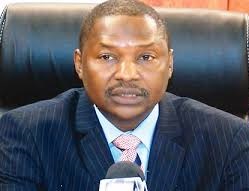 |
Attorney General of the Federation and Minister of Justice, Mr. Abubakar Malami
|
The Attorney General of the Federation and Minister of Justice, Mr. Abubakar Malami (SAN), said on Monday that a new law that would expand the definition of terrorism and create additional sanctions against terrorists as well as their financiers, was underway.
The AGF said the new legal provisions were contained in the new Terrorism Prohibition and Prevention Bill, that would replace the current Terrorism Prevention Act 2011 (amended in 2013).
Malami, represented by the Director, Public Prosecutions of the Federal Ministry of Justice, Mr. Umar Mohammed, spoke in Abuja during the opening ceremony of the ‘regional workshop on prison intelligence in a counter-terrorism context.’
Eight African countries including Mauritania, Republic of Chad, Kenya and Benin Republic were said to have participated in the three-day event organised by the International Institute for Justice and Rule of Law.
Speaking at the event, Malami, who noted that “the scale of terrorists’ incursion is constantly metamorphosing at an alarming and despicable rate,” said the new anti-terrorism law being put in place was in conformity with international standards.
He said, “In conformity with international standards, the Federal Ministry of Justice has also introduced new legal provisions in a new Terrorism Prohibition and Prevention Bill, which will replace the current Terrorism Prevention Act 2011 (amended in 2013).
“The new provisions seek to enhance coordination amongst relevant law enforcement, intelligence, prisons and security agencies. The new bill has also expanded the definition of terrorist financing and sanctions applicable to terrorists and those who fund terrorists.”
According to him, other initiatives he had taken “include the setting up of a robust unit in the Department of Public Prosecutions called the Complex Case Group.”
The unit, the minister said, “is charged with expeditious prosecution of terrorism and other complex cases.”
He said the unit with “specialist prosecutors” recently concluded over 1,100 counter-terrorism cases with over 300 convictions secured within one year.
The AGF described terrorism as a globally acknowledged “threat to international peace, security and development.”
He therefore called for international collaboration against the menace.
“It is clear that we need strong cross-border cooperation to make sure that law enforcement officials in Africa in collaboration with their counterparts in the prison services are well equipped to fight terrorist attacks through the gathering of adequate intelligence,” he said.
Malami said on the part of the Nigerian government, efforts were already being made “to address the problem of infrastructure as well as awaiting trial inmates across the country.”
He added, “The Federal Government is also investing in new technologies that will enhance intelligence gathering, information exchange and management of prison data in the country.”
As part of efforts to decongest the prisons, Malami said “the judiciary has also taken the initiative to set up mobile courts nearer to the prisons and to the victims.”
“The non-convicted suspects are currently going through de-radicalisation programme under the office of the National Security Adviser,” he added.
The Executive Director of IIJ, the organiser of the event, Mr. Thomas Wuchte, said the workshop was timely as a follow-up to an earlier event held in Malta in July 2017.
He said his organisation was interested in the de-radicalisation and proper rehabilitation of inmates as well as how information and intelligence gathered could be used for prosecution.
The Special Assistant to the President on Justice Reform, Mrs. Juliet Ibekaku, who works directly under the AGF, said the outcome of the deliberations at the event would be implemented.
She added, “Nigeria is partnering with the IIJ because Nigeria recognises that there is a challenge that will have to be dealt with – making sure that our prisons are safe and making sure that we decongest our prisons.”
“The AGF has highlighted the fact that in the past one year the OAGF has worked hard to ensure the hearing of over 1,000 cases.
“The Attorney-General of the Federation is also looking at how best to ensure that prisoners that are not supposed to be in prison are released. That is part of the project and is already ongoing.”
In this article:
